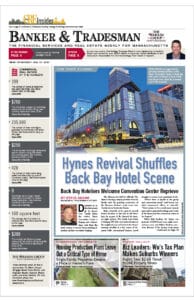
Criterion Development is proposing the construction of 230 apartments, retail space and offices in Bedford under the town’s mixed-use zoning bylaw.
A Texas-based developer is hoping to be the first to take advantage of a mixed-use zoning bylaw in Bedford to create a community of apartments and retail and office space on 17 acres.
Criterion Development, which has an office in Waltham, wants to build 230 rental units and 35,000 square feet of office space on the Massachusetts Turnpike at the intersection of Crosby and Plank streets. The Bedford Planning Board is scheduled to hold a hearing on April 5 to determine whether to issue a special permit for the project under the town’s mixed-use zoning bylaw.
“The original intent [of the bylaw] is to create a place where people can live, work and shop without having to burden the downtown,” said Robert C. Buckley, an attorney with Riemer & Braunstein in Boston who is representing Criterion.
The apartments will be located above 9,000 square feet of retail space. Twenty-five percent of the residences, which will be a mix of one- and two-bedroom units, will be affordable to people earning 80 percent or less of the area median income.
Monthly rents for the market-rate two-bedroom apartments will range from $1,600 to $1,800, while affordable units will rent for about $1,200, according to Buckley.
The development will infuse the region with sorely needed affordable housing that could be utilized by military and civilian personnel who work at nearby Hanscom Air Force Base, according to Buckley.
The 846-acre Hanscom complex is currently one of several bases that are being evaluated for possible closure by federal officials. The Base Realignment and Closure Commission, or BRAC, which is charged with evaluating Hanscom, was named about two weeks ago. The Boston Globe reported last Thursday that the Pentagon is considering turning over the Hanscom site to a private developer and then renting space on the base – one of several options that BRAC will consider this spring. If that occurs, that could lead to the transfer of personnel who operate the base, according to the Globe.
Gov. Mitt Romney and Sen. Edward M. Kennedy have been lobbying to save Hanscom, which pours millions, if not billions, of dollars into the regional economy through government contracts with local research firms and high-tech companies. Both leaders have proposed that the state pump $400 million in public and private funds into Hanscom to help keep it open. Romney filed a bond-funding measure which was approved by the Legislature last month that would provide $242 million to Hanscom.
Buckley said one of the things that the commission reviewing Hanscom may take into consideration is the availability of affordable housing in close proximity to the base.
‘Back to Our Roots’
A strong proponent of mixed-used development, Buckley said he sees other positive aspects in the Bedford proposal. The project, according to Buckley, recalls the village concept that is evident in early New England planning.
“People argue this is a departure from traditional zoning in New England, but I say we’re going back to our roots,” he said.
Buckley pointed to the city of Newton, which consists of smaller sections like Waban, Newton Centre and Newton Corner that were started as mixed-use developments at one point, as a prime example of the village concept.
While other communities in Massachusetts allow mixed-use development, Buckley said Bedford’s zoning bylaw, which was passed more than a year ago, is “very creative” because it gives the Planning Board the authority to alter the dimensional requirements of a project like density and height.
In addition – while other communities make it more difficult for mixed-use developments to proceed by requiring Town Meeting approval – in Bedford, developers can seek a special permit under the zoning bylaw that was crafted by the town.
“Bedford in some respects has taken the lead here,” Buckley said.
John K. McIlwain, a senior resident fellow with the Urban Land Institute, said traditionally zoning has separated uses, but in recent years the thinking has shifted.
Nowadays, a growing number of localities are creating mixed-use districts, but the communities often require developers to go through an extensive process of variances, reviews and community meetings, according to McIlwain.
“Having bylaws that create mixed-use districts is a really a very new way [of approaching zoning],” he said. “It’s very forward-thinking.”
McIlwain said many of the mixed-use communities that have been created are a success.
“What we’re finding is that these kinds of mixed-used neighborhoods are the most vibrant and have the most market value,” he said.
The housing, if it’s designed well, tends to sell more quickly, and the retail component in larger mixed-use developments does very well, he noted.
“Boston has a number of very successful mixed-used neighborhoods that were created before any of this zoning came into place,” he said.
Buckley noted that many Bay State communities are still reluctant to “engage in multifamily housing.”
“What I’ve been trying to advocate to local communities is it’s in everyone’s interest from a macroeconomic standpoint to encourage development of multifamily housing, some of it being affordable.”
Aglaia Pikounis may be reached at apikounis@thewarrengroup.com.






